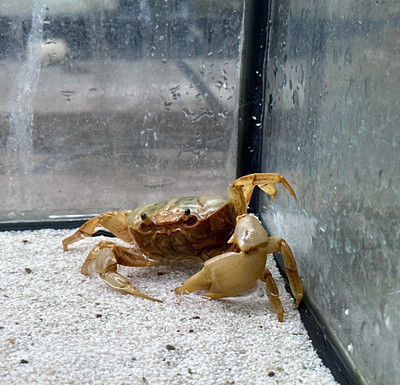Exploring the Fascinating Geosesarma Banana Crab
Posted by Max Gandara on on 13th Jul 2023
The natural world is filled with extraordinary creatures, and the Geosesarma banana crab (Geosesarma sp.) is no exception. Also known as
the "banana fiddler crab," this captivating crustacean species is native
to the tropical rainforests of Southeast Asia. With its vibrant colors
and peculiar habits, the Geosesarma banana crab has gained popularity
among aquarists and nature enthusiasts alike. In this article, we will
delve into the intriguing characteristics, habitat, behavior, and care
requirements of this unique crab species.
The Geosesarma banana crab showcases a mesmerizing blend of colors, with
varying shades of blue, purple, and orange adorning its carapace. Males
typically have larger, more elongated claws, while females possess
smaller, rounder claws. These distinctive appendages resemble a
fiddler's violin, giving rise to the common name "banana fiddler crab."
The carapace itself can range from 2 to 3 inches in size, making it a
visually striking addition to any aquarium.
Geosesarma banana crabs are native to the dense rainforests of Southeast
Asia, specifically in countries such as Malaysia, Indonesia, and
Singapore. Within their natural habitat, these crabs reside near
freshwater streams, rivers, and marshy areas. They often create burrows
in the damp soil or hide among the leaf litter and vegetation, using
their claws to sift through organic matter in search of food.
The Geosesarma banana crab is a semi-terrestrial species, meaning it
spends time both in water and on land. While they require access to
freshwater for drinking and reproduction, they can survive in brackish
water conditions as well. These crabs are generally docile in nature and
are known for their relatively peaceful behavior compared to other crab
species. However, males may engage in occasional territorial disputes,
often displaying their colorful claws in elaborate courtship rituals to
attract females.
In their natural habitat, Geosesarma banana crabs are omnivorous
creatures. They have a varied diet that includes plant matter, algae,
small invertebrates, and detritus. When kept in captivity, providing a
well-balanced diet is crucial for their health. Aquarists often offer a
combination of high-quality crab or shrimp pellets, algae wafers, fresh
fruits, and vegetables. Regular supplementation with calcium-rich foods
is necessary for the proper growth and maintenance of their exoskeleton.
Creating a suitable habitat for Geosesarma banana crabs requires careful
consideration. A spacious aquarium with both land and water areas is
essential. The water section should have a shallow depth, allowing the
crabs to fully submerge and climb out easily. The land area should be
furnished with a mix of soil, coconut husk, and leaf litter to mimic
their natural burrowing environment. Live plants can be added to enhance
the aesthetics and provide additional cover. It is crucial to maintain
appropriate temperature, humidity, and water quality parameters to
ensure the well-being of these crabs.
The Geosesarma banana crab is a captivating and visually striking
creature that has gained popularity among aquarium enthusiasts. Its
vibrant colors, unique claw shape, and semi-terrestrial nature make it a
fascinating addition to any tropical freshwater setup. Understanding
their natural habitat, behavior, and dietary needs is essential to
provide the optimal care and environment for these incredible crabs. By
recreating their natural habitat in captivity, aquarists can appreciate
and admire the beauty and intricacy of the Geosesarma banana crab's
existence.

